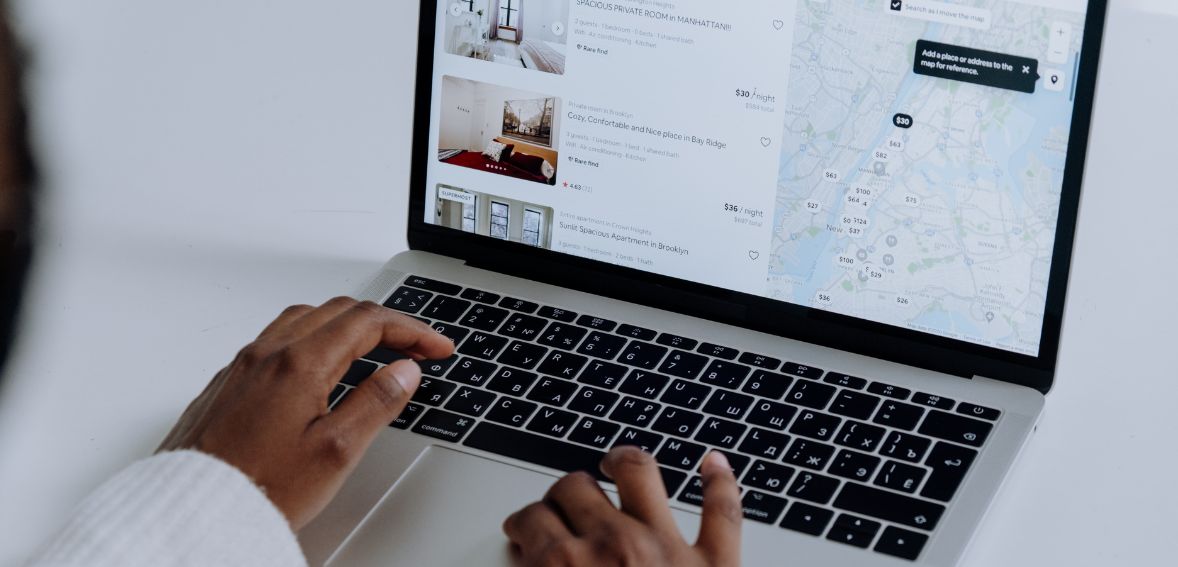
by Inez Kim July 12, 2024
Airbnb Rental Management can be as challenging as it is rewarding, especially as the market for short-term rentals grows increasingly competitive. Leveraging the right technology is essential to maintaining a high standard of guest satisfaction while optimizing the operational efficiency of your rental properties. Property management software tailored specifically for Airbnb rentals offers a comprehensive solution, automating and streamlining the myriad tasks of managing short-term rental properties.
From scheduling cleanings to managing bookings across multiple platforms, this software saves time and enhances the overall guest experience, making it indispensable for Airbnb hosts. This article explores the integral features, benefits, and considerations of choosing the ideal property management software for Airbnb rentals, ensuring hosts can maximize their rental success in this dynamic market.
In This Article
ToggleWhat is Rental Property Management Software?
Rental property management software is an indispensable tool for landlords and property managers. This specialized software automates tasks such as listing properties, screening tenants, managing leases, collecting rent, scheduling maintenance, and generating financial reports. By centralizing these functions, property management software significantly enhances the efficiency and effectiveness of managing rental properties, making it an essential asset for anyone involved in rental management.
Key Features of Property Management Software for Airbnb Rentals
Multi-Calendar and Unified Inbox
The multi-calendar function is one of the standout features of advanced Airbnb property management software. This tool is indispensable for property managers overseeing multiple listings. It integrates all property calendars into a single dashboard, allowing managers to view and control all properties’ availability and occupancy rates at a glance. This holistic view helps in avoiding double bookings and optimizes vacancy periods.
In addition to the multi-calendar, a unified inbox is another critical component. This feature consolidates all guest communications from various platforms into one centralized interface. Whether it’s inquiry responses, booking confirmations, or check-in instructions, having a unified inbox ensures that all communications are managed efficiently and promptly. This integration significantly reduces the risk of overlooked messages and enhances the responsiveness of property managers, thereby improving guest relations and satisfaction.
Advanced Reporting and Smart Automation
Airbnb property management software also comes equipped with advanced reporting capabilities. These tools provide comprehensive analytics on various aspects, such as occupancy rates, revenue trends, and guest demographics. Such detailed insights are crucial for property managers to make data-driven decisions that can enhance operational efficiency and optimize pricing strategies.
Furthermore, smart automation plays a pivotal role in streamlining day-to-day operations. Property managers can save significant amounts of time by automating repetitive tasks like sending guest communications, adjusting pricing based on market trends, and scheduling maintenance. These automations facilitate operational efficiency and ensure a consistent level of service, enhancing guest satisfaction and ultimately leading to higher profitability.
Reviews Management
Effective guest review management is essential for maintaining and enhancing Airbnb’s online reputation. Property management software Airbnb typically includes robust tools that aggregate and manage reviews from various online platforms. This functionality lets property managers keep a pulse on guest feedback, enabling them to address concerns and engage with reviewers promptly.
Property managers can foster a positive reputation by actively managing reviews and encouraging more bookings. Additionally, responding to reviews can demonstrate to potential guests that the managers are attentive and committed to providing a high-quality experience, further boosting occupancy rates and profitability.
Incorporating these features into your Airbnb management strategy through specialized property management software can transform how you manage rentals, improving efficiency, guest satisfaction, and revenue.
Comparative Analysis of Top Airbnb Management Software
Evaluating different Airbnb management software options is crucial for optimizing the efficiency and profitability of your rental properties. Among the leading contenders in the market are Guesty, Lodgify, Hostfully, Hostaway, and DoorLoop. Each platform offers a suite of distinct features tailored to streamline various facets of property management.
Guesty stands out with its robust automation tools, particularly for messaging and guest communications. This software facilitates seamless interaction with guests from booking to checkout, ensuring a high level of service without the constant need for manual intervention. Additionally, Guesty’s dynamic pricing tool helps hosts optimize their rates based on market trends and demand patterns.
Lodgify focuses on providing hosts with an easy-to-use website builder that integrates directly with their booking system. This allows property managers to create a personalized online presence, complete with booking functionality. Lodgify also offers extensive marketing tools, helping hosts increase visibility and attract more guests.
Hostfully is renowned for its comprehensive property management features, including a centralized calendar that integrates bookings from multiple platforms. This feature is invaluable for hosts managing listings on both Airbnb and other vacation rental sites. Hostfully also provides detailed performance analytics that helps hosts understand their operations and identify areas for improvement.
Hostaway emphasizes scalability, making it ideal for hosts who manage multiple properties. Its key features include centralized reservations, automated task scheduling, and maintenance management, which are critical for keeping operations smooth across several locations. Hostaway also integrates with major booking platforms, ensuring widespread exposure for your listings.
DoorLoop excels in the maintenance aspect of property management. It provides tools for scheduling repairs and regular maintenance, ensuring that properties are always in top condition for guests. DoorLoop’s financial management features are also notable, offering detailed expense tracking and revenue management capabilities.
Each of these solutions brings something unique to the table, but choosing the right property management software for Airbnb, like these, hinges on identifying which features align best with your specific management needs and goals. By leveraging the right Property Management Software Airbnb, hosts can significantly enhance their operational efficiency and guest satisfaction, leading to higher occupancy rates and increased revenue.
Benefits of Using Management Software for Airbnb Rentals
Property management software for Airbnb rentals streamlines various aspects of managing short-term rental properties. Here’s a more detailed exploration of the benefits such software offers:
Automated Communications:
One of the primary advantages of Airbnb’s property management software is the automation of communications. This feature allows hosts to set up automated responses to common inquiries, saving time and ensuring that guests receive prompt replies. This can enhance guest satisfaction by providing immediate interaction and assistance. Moreover, automated messaging tools can help maintain a consistent communication flow, reminding guests about check-in procedures, house rules, and check-out instructions without manual intervention.
Multiple Platform Management:
Property management software becomes indispensable for hosts listing their properties on multiple platforms besides Airbnb, such as Booking.com or Vrbo. It offers a master calendar consolidating bookings from all platforms, preventing double bookings and scheduling conflicts. This centralized approach to managing reservations ensures that hosts can easily update availability and streamline the management of multiple listings, significantly reducing the administrative burden.
Dynamic Pricing:
Dynamic pricing tools are another significant benefit of using property management software. These tools analyze real-time market data to adjust the pricing of listings automatically. Factors like local events, seasonal demand, and overall market trends are considered to optimize pricing strategies. This ensures that the property remains competitive, maximizing revenue by adjusting prices when demand spikes and reducing them to attract bookings during slower periods.
Team and Payment Management:
Managing a rental property involves coordinating with cleaning crews, maintenance staff, and other service providers. Property management software simplifies this process by centralizing team coordination tools, task scheduling, and progress tracking. Additionally, it facilitates the handling of payments, both incoming from guests and outgoing to contractors or service providers. This integration of operational and financial processes enhances overall efficiency and ensures smoother operations.
Performance Analytics:
Finally, access to detailed performance analytics is a crucial advantage offered by property management software Airbnb. These analytics provide insights into various metrics, such as occupancy rates, average nightly rates, and seasonal performance trends. Understanding these aspects helps hosts make informed decisions that can improve service quality, optimize pricing, and, ultimately, enhance mental performance.
By leveraging these advanced features, property management software for Airbnb simplifies rental properties management and contributes to a more profitable and professional hosting experience.
Future Trends in Airbnb Rental Management
The future landscape of Airbnb rental management is rapidly evolving, driven by technological advancements and shifting guest expectations. One of the primary trends is the increased use of automation in managing bookings, guest communications, and operational tasks. Automation tools, often part of the comprehensive Property Management Software Airbnb, enable hosts to minimize manual input, reduce errors, and ensure a seamless experience for both the guest and the manager.
Furthermore, integrating smart home technology is becoming standard in Airbnb properties. Smart locks, thermostats, lighting, and even appliances that can be controlled remotely enhance guest convenience and improve energy efficiency. These technologies allow property managers to offer personalized experiences—such as customizing temperature and lighting prior to arrival—while also monitoring and managing property conditions remotely, reducing the need for on-site visits.
Lastly, a significant shift towards sustainability is influencing property management strategies. More Airbnb hosts are adopting green practices, such as installing energy-efficient systems, using eco-friendly cleaning products, and encouraging recycling. This appeals to the environmentally conscious traveler and helps hosts reduce operational costs.
These trends, powered by innovations in property management software and smart technology, are setting a new standard in hospitality. They offer property managers unprecedented opportunities to enhance guest satisfaction, streamline operations, and boost profitability in the competitive Airbnb market.
Choosing the Right Software for Your Needs
Selecting the ideal property management software demands a comprehensive approach that starts with a deep understanding of your business needs and the specific characteristics of your clientele. This process is especially crucial for those managing properties on platforms like Airbnb, as the demands and expectations can vary significantly from traditional rental management.
The first step in this journey is to articulate your business requirements clearly. Consider the volume and type of properties you manage, the complexity of your daily operations, and any unique challenges you face. This clarity will guide you in identifying non-negotiable software features, such as automated booking systems, integrated communication tools, or robust financial reporting functionalities tailored to platforms like Airbnb.
Next, develop an in-depth profile of your clientele. Understanding your guests’ demographics, preferences, and expectations, particularly those booking through Airbnb, will help you pinpoint features that enhance their experience and streamline your interactions with them. For instance, multilingual support and currency conversion features might be essential if your properties cater to international tourists.
Creating a checklist of essential features is a critical step. This list should be prioritized based on your operational needs and customer service goals. Essential features might include real-time availability updates, easy check-in and check-out processes, efficient maintenance management, and dynamic pricing tools compatible with Property Management Software Airbnb setups.
Thorough market research is indispensable. Investigate different software solutions, focusing on those that offer specialized capabilities for managing Airbnb properties. Read user reviews, check ratings, and seek feedback from industry peers with firsthand experience with the software.
Finally, evaluate each software option’s potential return on investment (ROI). Consider both the direct costs, such as subscription fees, and indirect costs, like training time and potential downtime during software implementation. Balance these against the expected efficiency gains, improved customer satisfaction, and increased booking rates through Airbnb, which could lead to higher overall profitability.
Conclusion
Selecting the right property management software for Airbnb rentals is more than just a technological investment; it’s a strategic decision that can significantly influence the success of your rental business. As the short-term rental market continues to expand and evolve, embracing these digital tools will streamline operations and enhance the guest experience, thereby setting your properties apart in a competitive landscape. By carefully considering your specific needs, evaluating the features of various software solutions, and aligning them with the expectations of your guests, you can effectively optimize your operational workflow and maximize profitability.
Ultimately, the goal is to ensure that both hosts and guests alike benefit from a seamless, efficient, and enjoyable rental experience, making the investment in quality property management software a wise choice for any ambitious Airbnb host.
Frequently Asked Questions
The best property management software for Airbnb hosts depends on the specific needs of the property manager. Popular options like Guesty, Lodgify, and Hostaway offer a range of features tailored to Airbnb rentals, such as multi-calendar synchronization, dynamic pricing tools, and unified communication platforms. Evaluating your specific requirements, such as the number of properties, type of guests, and desired automation level, will help determine the most suitable software for your needs.
Property management software enhances guest satisfaction by streamlining communication, ensuring accurate booking calendars, and automating routine tasks. Features like automated messaging respond to guest inquiries promptly, while dynamic pricing tools adjust rates to market conditions, offering competitive pricing. Additionally, efficient management of cleanings and maintenance ensures that properties are in excellent condition upon guest arrival, significantly improving their overall experience.
Yes, many property management software solutions are designed to integrate seamlessly with multiple rental platforms such as Booking.com, Vrbo, and others. This capability allows hosts to manage all their listings from a single dashboard, ensuring consistent information across all platforms and significantly reducing the risk of double bookings or scheduling conflicts.
The costs of using Airbnb property management software vary depending on the provider and the range of features offered. Most platforms operate on a subscription model, with fees based on the number of properties managed or the volume of bookings handled. Some may offer basic packages for smaller hosts and more advanced features, including automation and analytics, for professional property managers at a higher cost. It’s important to consider the return on investment, as the right software can lead to increased efficiency, higher occupancy rates, and improved guest satisfaction, ultimately justifying the expense.

![{"type":"elementor","siteurl":"https://cloudrentalmanager.com/wp-json/","elements":[{"id":"bea45a6","elType":"widget","isInner":false,"isLocked":false,"settings":{"title":"Use Cases of Property Management Software","link":{"url":"","is_external":"","nofollow":"","custom_attributes":""},"size":"default","header_size":"h2","align":"","align_tablet":"","align_mobile":"","title_color":"#03212D","typography_typography":"custom","typography_font_family":"Roboto","typography_font_size":{"unit":"px","size":23,"sizes":[]},"typography_font_size_tablet":{"unit":"px","size":"","sizes":[]},"typography_font_size_mobile":{"unit":"px","size":"","sizes":[]},"typography_font_weight":"600","typography_text_transform":"","typography_font_style":"","typography_text_decoration":"","typography_line_height":{"unit":"px","size":"","sizes":[]},"typography_line_height_tablet":{"unit":"em","size":"","sizes":[]},"typography_line_height_mobile":{"unit":"em","size":"","sizes":[]},"typography_letter_spacing":{"unit":"px","size":"","sizes":[]},"typography_letter_spacing_tablet":{"unit":"px","size":"","sizes":[]},"typography_letter_spacing_mobile":{"unit":"px","size":"","sizes":[]},"typography_word_spacing":{"unit":"px","size":"","sizes":[]},"typography_word_spacing_tablet":{"unit":"em","size":"","sizes":[]},"typography_word_spacing_mobile":{"unit":"em","size":"","sizes":[]},"text_stroke_text_stroke_type":"","text_stroke_text_stroke":{"unit":"px","size":"","sizes":[]},"text_stroke_text_stroke_tablet":{"unit":"px","size":"","sizes":[]},"text_stroke_text_stroke_mobile":{"unit":"px","size":"","sizes":[]},"text_stroke_stroke_color":"#000","text_shadow_text_shadow_type":"","text_shadow_text_shadow":{"horizontal":0,"vertical":0,"blur":10,"color":"rgba(0,0,0,0.3)"},"blend_mode":"","_title":"","_margin":{"unit":"px","top":"","right":"","bottom":"","left":"","isLinked":true},"_margin_tablet":{"unit":"px","top":"","right":"","bottom":"","left":"","isLinked":true},"_margin_mobile":{"unit":"px","top":"","right":"","bottom":"","left":"","isLinked":true},"_padding":{"unit":"px","top":"","right":"","bottom":"","left":"","isLinked":true},"_padding_tablet":{"unit":"px","top":"","right":"","bottom":"","left":"","isLinked":true},"_padding_mobile":{"unit":"px","top":"","right":"","bottom":"","left":"","isLinked":true},"_element_width":"","_element_width_tablet":"","_element_width_mobile":"","_element_custom_width":{"unit":"%","size":"","sizes":[]},"_element_custom_width_tablet":{"unit":"px","size":"","sizes":[]},"_element_custom_width_mobile":{"unit":"px","size":"","sizes":[]},"_element_vertical_align":"","_element_vertical_align_tablet":"","_element_vertical_align_mobile":"","_position":"","_offset_orientation_h":"start","_offset_x":{"unit":"px","size":0,"sizes":[]},"_offset_x_tablet":{"unit":"px","size":"","sizes":[]},"_offset_x_mobile":{"unit":"px","size":"","sizes":[]},"_offset_x_end":{"unit":"px","size":0,"sizes":[]},"_offset_x_end_tablet":{"unit":"px","size":"","sizes":[]},"_offset_x_end_mobile":{"unit":"px","size":"","sizes":[]},"_offset_orientation_v":"start","_offset_y":{"unit":"px","size":0,"sizes":[]},"_offset_y_tablet":{"unit":"px","size":"","sizes":[]},"_offset_y_mobile":{"unit":"px","size":"","sizes":[]},"_offset_y_end":{"unit":"px","size":0,"sizes":[]},"_offset_y_end_tablet":{"unit":"px","size":"","sizes":[]},"_offset_y_end_mobile":{"unit":"px","size":"","sizes":[]},"_z_index":"","_z_index_tablet":"","_z_index_mobile":"","_element_id":"","_css_classes":"","_animation":"","_animation_tablet":"","_animation_mobile":"","animation_duration":"","_animation_delay":"","_transform_rotate_popover":"","_transform_rotateZ_effect":{"unit":"px","size":"","sizes":[]},"_transform_rotateZ_effect_tablet":{"unit":"deg","size":"","sizes":[]},"_transform_rotateZ_effect_mobile":{"unit":"deg","size":"","sizes":[]},"_transform_rotate_3d":"","_transform_rotateX_effect":{"unit":"px","size":"","sizes":[]},"_transform_rotateX_effect_tablet":{"unit":"deg","size":"","sizes":[]},"_transform_rotateX_effect_mobile":{"unit":"deg","size":"","sizes":[]},"_transform_rotateY_effect":{"unit":"px","size":"","sizes":[]},"_transform_rotateY_effect_tablet":{"unit":"deg","size":"","sizes":[]},"_transform_rotateY_effect_mobile":{"unit":"deg","size":"","sizes":[]},"_transform_perspective_effect":{"unit":"px","size":"","sizes":[]},"_transform_perspective_effect_tablet":{"unit":"px","size":"","sizes":[]},"_transform_perspective_effect_mobile":{"unit":"px","size":"","sizes":[]},"_transform_translate_popover":"","_transform_translateX_effect":{"unit":"px","size":"","sizes":[]},"_transform_translateX_effect_tablet":{"unit":"px","size":"","sizes":[]},"_transform_translateX_effect_mobile":{"unit":"px","size":"","sizes":[]},"_transform_translateY_effect":{"unit":"px","size":"","sizes":[]},"_transform_translateY_effect_tablet":{"unit":"px","size":"","sizes":[]},"_transform_translateY_effect_mobile":{"unit":"px","size":"","sizes":[]},"_transform_scale_popover":"","_transform_keep_proportions":"yes","_transform_scale_effect":{"unit":"px","size":"","sizes":[]},"_transform_scale_effect_tablet":{"unit":"px","size":"","sizes":[]},"_transform_scale_effect_mobile":{"unit":"px","size":"","sizes":[]},"_transform_scaleX_effect":{"unit":"px","size":"","sizes":[]},"_transform_scaleX_effect_tablet":{"unit":"px","size":"","sizes":[]},"_transform_scaleX_effect_mobile":{"unit":"px","size":"","sizes":[]},"_transform_scaleY_effect":{"unit":"px","size":"","sizes":[]},"_transform_scaleY_effect_tablet":{"unit":"px","size":"","sizes":[]},"_transform_scaleY_effect_mobile":{"unit":"px","size":"","sizes":[]},"_transform_skew_popover":"","_transform_skewX_effect":{"unit":"px","size":"","sizes":[]},"_transform_skewX_effect_tablet":{"unit":"deg","size":"","sizes":[]},"_transform_skewX_effect_mobile":{"unit":"deg","size":"","sizes":[]},"_transform_skewY_effect":{"unit":"px","size":"","sizes":[]},"_transform_skewY_effect_tablet":{"unit":"deg","size":"","sizes":[]},"_transform_skewY_effect_mobile":{"unit":"deg","size":"","sizes":[]},"_transform_flipX_effect":"","_transform_flipY_effect":"","_transform_rotate_popover_hover":"","_transform_rotateZ_effect_hover":{"unit":"px","size":"","sizes":[]},"_transform_rotateZ_effect_hover_tablet":{"unit":"deg","size":"","sizes":[]},"_transform_rotateZ_effect_hover_mobile":{"unit":"deg","size":"","sizes":[]},"_transform_rotate_3d_hover":"","_transform_rotateX_effect_hover":{"unit":"px","size":"","sizes":[]},"_transform_rotateX_effect_hover_tablet":{"unit":"deg","size":"","sizes":[]},"_transform_rotateX_effect_hover_mobile":{"unit":"deg","size":"","sizes":[]},"_transform_rotateY_effect_hover":{"unit":"px","size":"","sizes":[]},"_transform_rotateY_effect_hover_tablet":{"unit":"deg","size":"","sizes":[]},"_transform_rotateY_effect_hover_mobile":{"unit":"deg","size":"","sizes":[]},"_transform_perspective_effect_hover":{"unit":"px","size":"","sizes":[]},"_transform_perspective_effect_hover_tablet":{"unit":"px","size":"","sizes":[]},"_transform_perspective_effect_hover_mobile":{"unit":"px","size":"","sizes":[]},"_transform_translate_popover_hover":"","_transform_translateX_effect_hover":{"unit":"px","size":"","sizes":[]},"_transform_translateX_effect_hover_tablet":{"unit":"px","size":"","sizes":[]},"_transform_translateX_effect_hover_mobile":{"unit":"px","size":"","sizes":[]},"_transform_translateY_effect_hover":{"unit":"px","size":"","sizes":[]},"_transform_translateY_effect_hover_tablet":{"unit":"px","size":"","sizes":[]},"_transform_translateY_effect_hover_mobile":{"unit":"px","size":"","sizes":[]},"_transform_scale_popover_hover":"","_transform_keep_proportions_hover":"yes","_transform_scale_effect_hover":{"unit":"px","size":"","sizes":[]},"_transform_scale_effect_hover_tablet":{"unit":"px","size":"","sizes":[]},"_transform_scale_effect_hover_mobile":{"unit":"px","size":"","sizes":[]},"_transform_scaleX_effect_hover":{"unit":"px","size":"","sizes":[]},"_transform_scaleX_effect_hover_tablet":{"unit":"px","size":"","sizes":[]},"_transform_scaleX_effect_hover_mobile":{"unit":"px","size":"","sizes":[]},"_transform_scaleY_effect_hover":{"unit":"px","size":"","sizes":[]},"_transform_scaleY_effect_hover_tablet":{"unit":"px","size":"","sizes":[]},"_transform_scaleY_effect_hover_mobile":{"unit":"px","size":"","sizes":[]},"_transform_skew_popover_hover":"","_transform_skewX_effect_hover":{"unit":"px","size":"","sizes":[]},"_transform_skewX_effect_hover_tablet":{"unit":"deg","size":"","sizes":[]},"_transform_skewX_effect_hover_mobile":{"unit":"deg","size":"","sizes":[]},"_transform_skewY_effect_hover":{"unit":"px","size":"","sizes":[]},"_transform_skewY_effect_hover_tablet":{"unit":"deg","size":"","sizes":[]},"_transform_skewY_effect_hover_mobile":{"unit":"deg","size":"","sizes":[]},"_transform_flipX_effect_hover":"","_transform_flipY_effect_hover":"","_transform_transition_hover":{"unit":"px","size":"","sizes":[]},"motion_fx_transform_x_anchor_point":"","motion_fx_transform_x_anchor_point_tablet":"","motion_fx_transform_x_anchor_point_mobile":"","motion_fx_transform_y_anchor_point":"","motion_fx_transform_y_anchor_point_tablet":"","motion_fx_transform_y_anchor_point_mobile":"","_background_background":"","_background_color":"","_background_color_stop":{"unit":"%","size":0,"sizes":[]},"_background_color_stop_tablet":{"unit":"%"},"_background_color_stop_mobile":{"unit":"%"},"_background_color_b":"#f2295b","_background_color_b_stop":{"unit":"%","size":100,"sizes":[]},"_background_color_b_stop_tablet":{"unit":"%"},"_background_color_b_stop_mobile":{"unit":"%"},"_background_gradient_type":"linear","_background_gradient_angle":{"unit":"deg","size":180,"sizes":[]},"_background_gradient_angle_tablet":{"unit":"deg"},"_background_gradient_angle_mobile":{"unit":"deg"},"_background_gradient_position":"center center","_background_image":{"url":"","id":"","size":""},"_background_image_tablet":{"url":"","id":"","size":""},"_background_image_mobile":{"url":"","id":"","size":""},"_background_position":"","_background_position_tablet":"","_background_position_mobile":"","_background_xpos":{"unit":"px","size":0,"sizes":[]},"_background_xpos_tablet":{"unit":"px","size":0,"sizes":[]},"_background_xpos_mobile":{"unit":"px","size":0,"sizes":[]},"_background_ypos":{"unit":"px","size":0,"sizes":[]},"_background_ypos_tablet":{"unit":"px","size":0,"sizes":[]},"_background_ypos_mobile":{"unit":"px","size":0,"sizes":[]},"_background_attachment":"","_background_repeat":"","_background_repeat_tablet":"","_background_repeat_mobile":"","_background_size":"","_background_size_tablet":"","_background_size_mobile":"","_background_bg_width":{"unit":"%","size":100,"sizes":[]},"_background_bg_width_tablet":{"unit":"px","size":"","sizes":[]},"_background_bg_width_mobile":{"unit":"px","size":"","sizes":[]},"_background_video_link":"","_background_video_start":"","_background_video_end":"","_background_play_once":"","_background_play_on_mobile":"","_background_privacy_mode":"","_background_video_fallback":{"url":"","id":"","size":""},"_background_slideshow_gallery":[],"_background_slideshow_loop":"yes","_background_slideshow_slide_duration":5000,"_background_slideshow_slide_transition":"fade","_background_slideshow_transition_duration":500,"_background_slideshow_background_size":"","_background_slideshow_background_size_tablet":"","_background_slideshow_background_size_mobile":"","_background_slideshow_background_position":"","_background_slideshow_background_position_tablet":"","_background_slideshow_background_position_mobile":"","_background_slideshow_lazyload":"","_background_slideshow_ken_burns":"","_background_slideshow_ken_burns_zoom_direction":"in","_background_hover_background":"","_background_hover_color":"","_background_hover_color_stop":{"unit":"%","size":0,"sizes":[]},"_background_hover_color_stop_tablet":{"unit":"%"},"_background_hover_color_stop_mobile":{"unit":"%"},"_background_hover_color_b":"#f2295b","_background_hover_color_b_stop":{"unit":"%","size":100,"sizes":[]},"_background_hover_color_b_stop_tablet":{"unit":"%"},"_background_hover_color_b_stop_mobile":{"unit":"%"},"_background_hover_gradient_type":"linear","_background_hover_gradient_angle":{"unit":"deg","size":180,"sizes":[]},"_background_hover_gradient_angle_tablet":{"unit":"deg"},"_background_hover_gradient_angle_mobile":{"unit":"deg"},"_background_hover_gradient_position":"center center","_background_hover_image":{"url":"","id":"","size":""},"_background_hover_image_tablet":{"url":"","id":"","size":""},"_background_hover_image_mobile":{"url":"","id":"","size":""},"_background_hover_position":"","_background_hover_position_tablet":"","_background_hover_position_mobile":"","_background_hover_xpos":{"unit":"px","size":0,"sizes":[]},"_background_hover_xpos_tablet":{"unit":"px","size":0,"sizes":[]},"_background_hover_xpos_mobile":{"unit":"px","size":0,"sizes":[]},"_background_hover_ypos":{"unit":"px","size":0,"sizes":[]},"_background_hover_ypos_tablet":{"unit":"px","size":0,"sizes":[]},"_background_hover_ypos_mobile":{"unit":"px","size":0,"sizes":[]},"_background_hover_attachment":"","_background_hover_repeat":"","_background_hover_repeat_tablet":"","_background_hover_repeat_mobile":"","_background_hover_size":"","_background_hover_size_tablet":"","_background_hover_size_mobile":"","_background_hover_bg_width":{"unit":"%","size":100,"sizes":[]},"_background_hover_bg_width_tablet":{"unit":"px","size":"","sizes":[]},"_background_hover_bg_width_mobile":{"unit":"px","size":"","sizes":[]},"_background_hover_video_link":"","_background_hover_video_start":"","_background_hover_video_end":"","_background_hover_play_once":"","_background_hover_play_on_mobile":"","_background_hover_privacy_mode":"","_background_hover_video_fallback":{"url":"","id":"","size":""},"_background_hover_slideshow_gallery":[],"_background_hover_slideshow_loop":"yes","_background_hover_slideshow_slide_duration":5000,"_background_hover_slideshow_slide_transition":"fade","_background_hover_slideshow_transition_duration":500,"_background_hover_slideshow_background_size":"","_background_hover_slideshow_background_size_tablet":"","_background_hover_slideshow_background_size_mobile":"","_background_hover_slideshow_background_position":"","_background_hover_slideshow_background_position_tablet":"","_background_hover_slideshow_background_position_mobile":"","_background_hover_slideshow_lazyload":"","_background_hover_slideshow_ken_burns":"","_background_hover_slideshow_ken_burns_zoom_direction":"in","_background_hover_transition":{"unit":"px","size":"","sizes":[]},"_border_border":"","_border_width":{"unit":"px","top":"","right":"","bottom":"","left":"","isLinked":true},"_border_width_tablet":{"unit":"px","top":"","right":"","bottom":"","left":"","isLinked":true},"_border_width_mobile":{"unit":"px","top":"","right":"","bottom":"","left":"","isLinked":true},"_border_color":"","_border_radius":{"unit":"px","top":"","right":"","bottom":"","left":"","isLinked":true},"_border_radius_tablet":{"unit":"px","top":"","right":"","bottom":"","left":"","isLinked":true},"_border_radius_mobile":{"unit":"px","top":"","right":"","bottom":"","left":"","isLinked":true},"_box_shadow_box_shadow_type":"","_box_shadow_box_shadow":{"horizontal":0,"vertical":0,"blur":10,"spread":0,"color":"rgba(0,0,0,0.5)"},"_box_shadow_box_shadow_position":" ","_border_hover_border":"","_border_hover_width":{"unit":"px","top":"","right":"","bottom":"","left":"","isLinked":true},"_border_hover_width_tablet":{"unit":"px","top":"","right":"","bottom":"","left":"","isLinked":true},"_border_hover_width_mobile":{"unit":"px","top":"","right":"","bottom":"","left":"","isLinked":true},"_border_hover_color":"","_border_radius_hover":{"unit":"px","top":"","right":"","bottom":"","left":"","isLinked":true},"_border_radius_hover_tablet":{"unit":"px","top":"","right":"","bottom":"","left":"","isLinked":true},"_border_radius_hover_mobile":{"unit":"px","top":"","right":"","bottom":"","left":"","isLinked":true},"_box_shadow_hover_box_shadow_type":"","_box_shadow_hover_box_shadow":{"horizontal":0,"vertical":0,"blur":10,"spread":0,"color":"rgba(0,0,0,0.5)"},"_box_shadow_hover_box_shadow_position":" ","_border_hover_transition":{"unit":"px","size":"","sizes":[]},"_mask_switch":"","_mask_shape":"circle","_mask_image":{"url":"","id":"","size":""},"_mask_notice":"","_mask_size":"contain","_mask_size_tablet":"","_mask_size_mobile":"","_mask_size_scale":{"unit":"%","size":100,"sizes":[]},"_mask_size_scale_tablet":{"unit":"px","size":"","sizes":[]},"_mask_size_scale_mobile":{"unit":"px","size":"","sizes":[]},"_mask_position":"center center","_mask_position_tablet":"","_mask_position_mobile":"","_mask_position_x":{"unit":"%","size":0,"sizes":[]},"_mask_position_x_tablet":{"unit":"px","size":"","sizes":[]},"_mask_position_x_mobile":{"unit":"px","size":"","sizes":[]},"_mask_position_y":{"unit":"%","size":0,"sizes":[]},"_mask_position_y_tablet":{"unit":"px","size":"","sizes":[]},"_mask_position_y_mobile":{"unit":"px","size":"","sizes":[]},"_mask_repeat":"no-repeat","_mask_repeat_tablet":"","_mask_repeat_mobile":"","hide_desktop":"","hide_tablet":"","hide_mobile":""},"defaultEditSettings":{"defaultEditRoute":"content"},"elements":[],"widgetType":"heading","editSettings":{"defaultEditRoute":"content","panel":{"activeTab":"content","activeSection":"section_title"}},"htmlCache":"\t\t\n\t\t\tUse Cases of Property Management Software\t\t\n\t\t"}]}](https://cloudrentalmanager.com/wp-content/uploads/2024/07/4-Choose-a-Property-Management-System.jpg)
